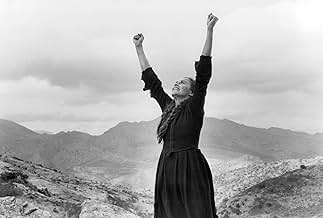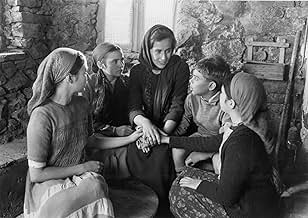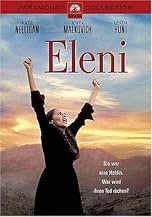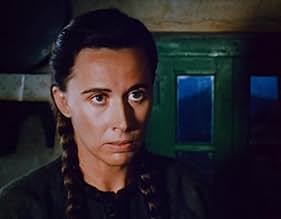PUNTUACIÓN EN IMDb
6,9/10
1,7 mil
TU PUNTUACIÓN
Añade un argumento en tu idiomaA mother's love for her children leads to a son's revenge for her death in this dramatic thriller that begins during the Greek civil war.A mother's love for her children leads to a son's revenge for her death in this dramatic thriller that begins during the Greek civil war.A mother's love for her children leads to a son's revenge for her death in this dramatic thriller that begins during the Greek civil war.
Argumento
¿Sabías que...?
- CuriosidadesAdditional flashback scenes were filmed featuring Alfred Molina as Nick's father Christos (played by Steve Plytas in the 1980s scenes). Although Molina was credited as "Young Christos" in press materials, and his scenes were shown in publicity photos, his role was almost completely cut from the final version, and his name does not appear in the credits. Molina's only remaining footage in the released film is a single shot of Christos taking a photograph of Eleni, Nikola and family, with his face partially obscured by his camera.
Reseña destacada
This is not a comment to the movie itself. The bits I have seen show at least an accurate portrayal of rural Greece in the late 40's along with the political "turmoil" of the time. Acting was above average in general, although some members of the cast, notably Malkovich, could have done a slightly better job.
So, is this propaganda? Of course it is BUT with more grains of truth than your average propaganda film, especially an American made. Yes, Mr Gatzoyannis (unless he is ashamed to use his real family name and resorts to "Gage") had lost his mother during the civil war. He is supposed to be one-sided, who wouldn't? He wrote a book about it, good for him. Someone made a film based on it, good for them. And now, many of us are bickering about what it is, propaganda or not, who are the good and who are the bad ones and so on...
A commentator before said that war is the end of civilization. True! A civil war though makes an "ordinary" war look quite civilized and "noble". Americans surely have their experience, they have gone through a terrible civil war. We, Greeks, have our experience which, sadly, is more "fresh" - lots of people that lived through it are still around to talk about it. Kids being taken from their mothers' arms to be transported..where? Brother killing brother (literally!) and generally bringing down whatever was once dear. Who's the bad guy? Which brother gets moral high ground? The one who took to mountains, kidnapped young ones to put them through a grim life behind the Iron Curtain, laid waste to his land and his home? Or the other, who after suffering all that, imprisoned those left behind (the majority of which were not part of the armed struggle and suffered along too), exiled them to desolate barren islands (there are more than we need of those in the Aegean), made them "dance" with cats in a sack (interesting how democracy, or "democracy", can be as horrendous as communism or any other totalitarian regime) and generally held them at the "border" of society until 1974. Who gets praise and who gets blame? You don't know? I think you do!
History was always written by victors, this is no exception. What is an exception in this case is that this particular "victor" (Gage) abstained his country's drama until it "suited" him to be a part of it. Having lost a loved one, a parent, in war is no unique to him, millions of people did! Did he live the ongoing "plague" that the civil war was? From the comfort of his house, half a world away. It is almost as if I, who have never been to the US, write a book about the drama of the Indians. Whatever moral high ground he possessed he lessened being that "distanced" from the whole scenery of it and its consequences. In short, this book and film portray HIS side, not his ideology's side but his personal side. It is easy to place blame, very hard to do so for one side only!
I will not go into the politics of that period, that is for another place and another time. Decent film, worth a viewing if not for anything else for an accurate portrayal of the "scenery". No stars awarded as I have not seen it all, just bits and pieces.
So, is this propaganda? Of course it is BUT with more grains of truth than your average propaganda film, especially an American made. Yes, Mr Gatzoyannis (unless he is ashamed to use his real family name and resorts to "Gage") had lost his mother during the civil war. He is supposed to be one-sided, who wouldn't? He wrote a book about it, good for him. Someone made a film based on it, good for them. And now, many of us are bickering about what it is, propaganda or not, who are the good and who are the bad ones and so on...
A commentator before said that war is the end of civilization. True! A civil war though makes an "ordinary" war look quite civilized and "noble". Americans surely have their experience, they have gone through a terrible civil war. We, Greeks, have our experience which, sadly, is more "fresh" - lots of people that lived through it are still around to talk about it. Kids being taken from their mothers' arms to be transported..where? Brother killing brother (literally!) and generally bringing down whatever was once dear. Who's the bad guy? Which brother gets moral high ground? The one who took to mountains, kidnapped young ones to put them through a grim life behind the Iron Curtain, laid waste to his land and his home? Or the other, who after suffering all that, imprisoned those left behind (the majority of which were not part of the armed struggle and suffered along too), exiled them to desolate barren islands (there are more than we need of those in the Aegean), made them "dance" with cats in a sack (interesting how democracy, or "democracy", can be as horrendous as communism or any other totalitarian regime) and generally held them at the "border" of society until 1974. Who gets praise and who gets blame? You don't know? I think you do!
History was always written by victors, this is no exception. What is an exception in this case is that this particular "victor" (Gage) abstained his country's drama until it "suited" him to be a part of it. Having lost a loved one, a parent, in war is no unique to him, millions of people did! Did he live the ongoing "plague" that the civil war was? From the comfort of his house, half a world away. It is almost as if I, who have never been to the US, write a book about the drama of the Indians. Whatever moral high ground he possessed he lessened being that "distanced" from the whole scenery of it and its consequences. In short, this book and film portray HIS side, not his ideology's side but his personal side. It is easy to place blame, very hard to do so for one side only!
I will not go into the politics of that period, that is for another place and another time. Decent film, worth a viewing if not for anything else for an accurate portrayal of the "scenery". No stars awarded as I have not seen it all, just bits and pieces.
- Maegnas
- 28 sept 2008
- Enlace permanente
Selecciones populares
Inicia sesión para calificar y añadir a tu lista para recibir recomendaciones personalizadas
- How long is Eleni?Con tecnología de Alexa
Detalles
Taquilla
- Presupuesto
- 12.000.000 US$ (estimación)
- Recaudación en Estados Unidos y Canadá
- 305.102 US$
- Fin de semana de estreno en EE. UU. y Canadá
- 27.875 US$
- 3 nov 1985
- Recaudación en todo el mundo
- 305.102 US$
- Duración1 hora 54 minutos
- Color
- Mezcla de sonido
- Relación de aspecto
- 1.85 : 1
Contribuir a esta página
Sugerir un cambio o añadir el contenido que falta

Principal laguna de datos
By what name was Eleni (1985) officially released in India in English?
Responde




















